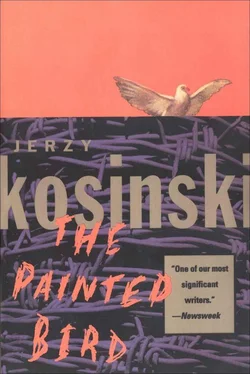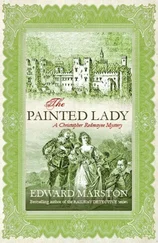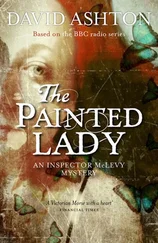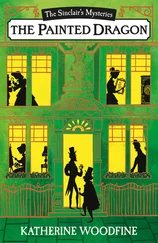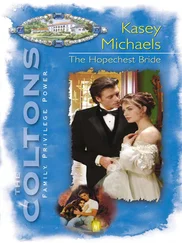Jerzy Kosiński - The Painted Bird
Здесь есть возможность читать онлайн «Jerzy Kosiński - The Painted Bird» весь текст электронной книги совершенно бесплатно (целиком полную версию без сокращений). В некоторых случаях можно слушать аудио, скачать через торрент в формате fb2 и присутствует краткое содержание. Год выпуска: 1965, ISBN: 1965, Жанр: Детская проза, на английском языке. Описание произведения, (предисловие) а так же отзывы посетителей доступны на портале библиотеки ЛибКат.
- Название:The Painted Bird
- Автор:
- Жанр:
- Год:1965
- ISBN:978-0-8021-9575-3
- Рейтинг книги:4 / 5. Голосов: 1
-
Избранное:Добавить в избранное
- Отзывы:
-
Ваша оценка:
- 80
- 1
- 2
- 3
- 4
- 5
The Painted Bird: краткое содержание, описание и аннотация
Предлагаем к чтению аннотацию, описание, краткое содержание или предисловие (зависит от того, что написал сам автор книги «The Painted Bird»). Если вы не нашли необходимую информацию о книге — напишите в комментариях, мы постараемся отыскать её.
The Painted Bird — читать онлайн бесплатно полную книгу (весь текст) целиком
Ниже представлен текст книги, разбитый по страницам. Система сохранения места последней прочитанной страницы, позволяет с удобством читать онлайн бесплатно книгу «The Painted Bird», без необходимости каждый раз заново искать на чём Вы остановились. Поставьте закладку, и сможете в любой момент перейти на страницу, на которой закончили чтение.
Интервал:
Закладка:
There was no way out of the situation, no matter how one looked at it. Parents, as Gavrila often told me, had a right to their children. I was not yet grown up: I was only twelve. Even if they did not want to, it was their duty to take me away.
I looked at them again. The woman smiled at me through the tear-smudged powder on her face. The man excitedly rubbed his hands together. They did not look like people who would beat me. On the contrary, they seemed frail and ailing.
My uniform was now open and the birthmark plainly visible. They bent over me, crying, hugging and kissing me. I was undecided again. I knew that I could run away anytime, jump on one of the crowded trains and ride it until no one could trace me. But I wanted to be found by Gavrila, and therefore it was wise not to run away. I knew that rejoining my parents meant the end of all my dreams of becoming a great inventor of fuses for changing people’s color, of working in the land of Gavrila and Mitka, where today was already tomorrow.
My world was becoming cramped like the attic of a peasant’s shed. At all times a man risked falling into the snares of those who hated and wanted to persecute him, or into the arms of those who loved and wished to protect him.
I could not readily accept the idea of suddenly becoming someone’s real son, of being caressed and cared for, of having to obey people, not because they were stronger and could hurt me, but because they were my parents and had rights which no one could take away from them.
Of course, parents had their uses when a child was very small. But a boy of my age should be free from any restriction. He should be able to choose for himself the people whom he wished to follow and learn from. Yet I could not decide to run away. I looked at the tearful face of the woman who was my mother, at the trembling man who was my father, uncertain whether they should stroke my hair or pat my shoulder, and some inner force restrained me and forbade me to fly off. I suddenly felt like Lekh’s painted bird, which some unknown force was pulling toward his kind.
My mother remained with me alone in the room; my father went out to take care of the formalities. She said that I would be happy with her and my father, that I could do anything I wanted. They would make me a new uniform, an exact copy of the one I was wearing.
As I listened to all this, I recalled the hare which Makar once caught in a trap. He was a fine large animal. One could sense in him a drive for freedom, for powerful leaps, playful tumbles, and swift escapes. Locked in a cage he raged, stamped his feet, beat against the walls. After a few days Makar, furious over his restlessness, threw a heavy tarpaulin over him. The hare struggled and fought under it, but finally gave up. Eventually he became tame and ate from my hand. One day Makar got drunk and left the door of the cage open. The hare jumped out and started toward the meadow. I thought he would plunge into the tall grass with one huge leap and never be seen again. But he seemed to savor his freedom and just sat down, with ears pricked up. From the distant fields and woods came sounds that only he could hear and understand, smells and fragrances that only he could appreciate. It was all his own; he had left the cage behind.
Suddenly there was a change in him. The alert ears flopped, he sagged somehow, and grew smaller. He jumped once and his whiskers perked up, but he did not run away. I whistled loudly in the hope that it would bring him to his senses, make him realize that he was free. He only turned around and sluggishly, as though suddenly aged and shrunken, moved toward the hutch. On his way he stopped for a while, stood up, and looked back once again with ears pricked; then he passed the rabbits gazing at him and jumped into the cage. I closed the door, though it was unnecessary. He now carried the cage in himself; it bound his brain and heart and paralyzed his muscles. Freedom, which had set him apart from other resigned, drowsy rabbits, left him like the wind-driven fragrance evaporating from crushed, dried clover.
My father came back. Both he and my mother hugged me and looked me over and exchanged some comments about me. It was time to leave the orphanage. We went to say goodbye to the Silent One. He glanced suspiciously at my parents, shaking his head, and refused to greet them.
We went out into the street and my father helped to carry my books. There was chaos everywhere. Ragged, dirty, haggard people with sacks on their backs were returning to their homes, quarreling with those who had occupied them during the war. I walked between my parents, feeling their hands on my shoulders and hair, feeling smothered by their love and protection.
They took me to their apartment. This they had been able to borrow with great difficulty after they had learned that a boy answering their son’s description was at the local Center, and a meeting could be arranged. At the apartment a surprise awaited me. They had another child, a four-year-old boy. My parents explained to me that he was an orphan whose parents and older sister had been killed. He had been saved by his old nurse, who handed him to my father at some point in their wanderings during the third year of the war. They had adopted him, and I could see that they loved him very much.
This only contributed to my doubts. Would it not be better for me to stay on my own and wait for Gavrila, who would eventually adopt me? I would much prefer to be alone again, wandering from one village to the next, from one town to another, never knowing what might happen. Here everything was very predictable.
The apartment was small, consisting of one room and a kitchen. There was a washroom on the stairs. It was stuffy and we were crowded, getting in one another’s way. My father had a heart condition. If anything upset him he grew pale and perspiration covered his face. Then he would swallow some pills. My mother went out at dawn to wait in the endless queues for food. When she returned, she started cooking and cleaning.
The small boy was a nuisance. He insisted on playing whenever I was reading the newspaper reporting the Red Army successes. He would clutch my pants and knock over my books. One day he annoyed me so much that I grabbed his arm and squeezed it hard. Something cracked and the boy screamed madly. My father called a doctor; the bone was broken. That night, when the child was in bed with his arm in a cast, he whimpered quietly and glanced at me in terror. My parents looked at me without a word.
I often left secretly to meet with the Silent One. One day he did not turn up at the appointed time. They told me later at the orphanage that he had been transferred to another city.
Spring arrived. On a rainy day in May the news came that the war was over. People danced in the streets, kissing and hugging one another. In the evening we heard the ambulances throughout the city picking up all the people injured in the brawls which broke out at the drinking parties. During the days that followed I visited the orphanage frequently, hoping to find a letter from Gavrila or Mitka. But there was none.
I read the newspapers carefully, trying to figure out what was happening in the world. Not all the armies were due to return home. Germany was to be occupied and it might be years before Gavrila and Mitka would return.
Life in the city was becoming more difficult. Every day masses of people arrived from all over the country, hoping that it might be easier to make a living in an industrial center than in the country, and that they would be able to earn back all that they had lost. Unable to find work or living quarters, bewildered people tramped the streets, struggled for seats in streetcars, buses, and restaurants. They were nervous, short-tempered, and quarrelsome. It seemed that everyone believed himself chosen by fate merely because he had survived the war, and felt entitled to deference on that account.
Читать дальшеИнтервал:
Закладка:
Похожие книги на «The Painted Bird»
Представляем Вашему вниманию похожие книги на «The Painted Bird» списком для выбора. Мы отобрали схожую по названию и смыслу литературу в надежде предоставить читателям больше вариантов отыскать новые, интересные, ещё непрочитанные произведения.
Обсуждение, отзывы о книге «The Painted Bird» и просто собственные мнения читателей. Оставьте ваши комментарии, напишите, что Вы думаете о произведении, его смысле или главных героях. Укажите что конкретно понравилось, а что нет, и почему Вы так считаете.
